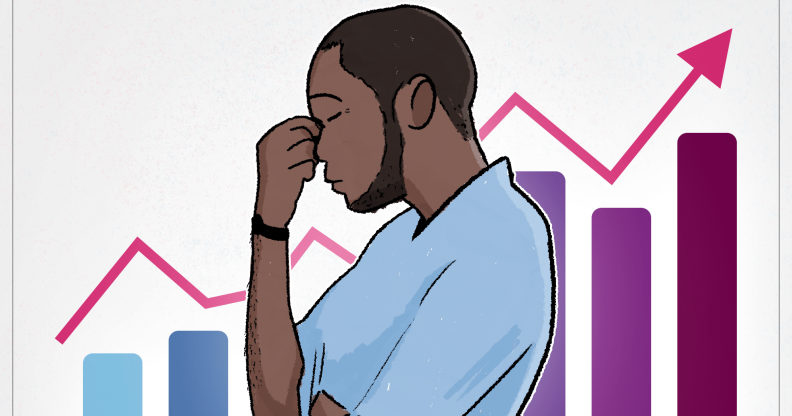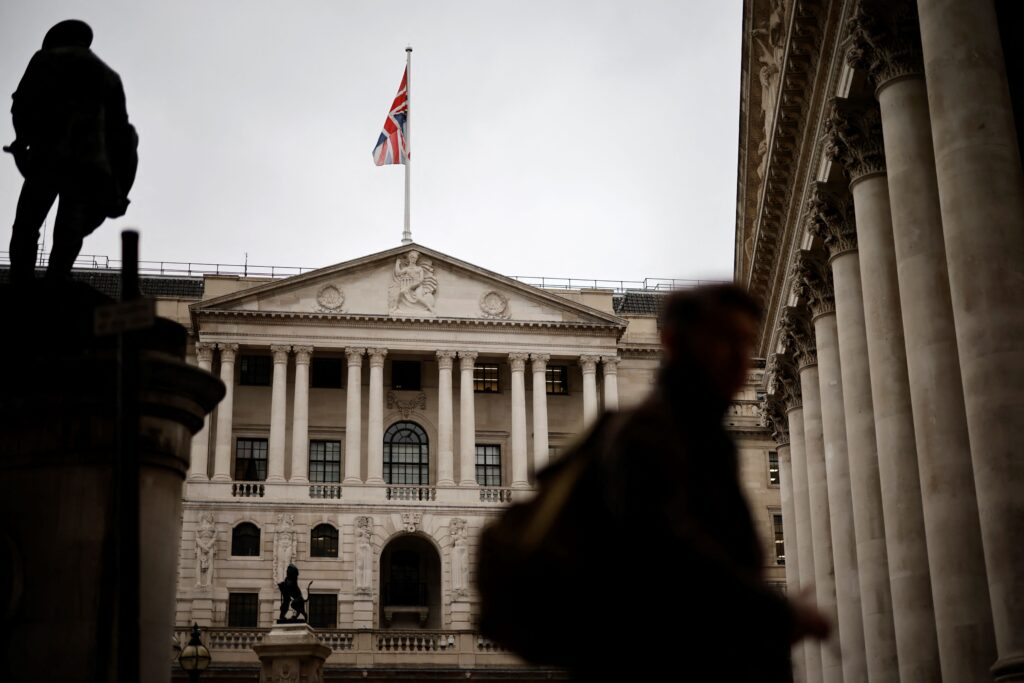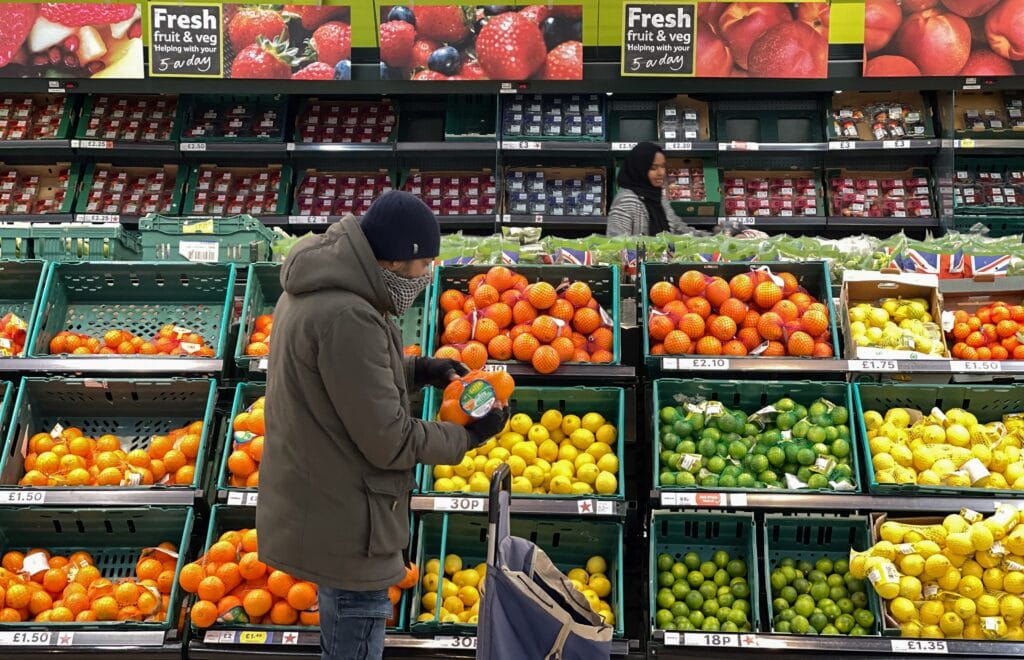Lonely, afraid and forced back into the closet: How the cost of living crisis is hurting LGBT+ Brits

The cost of living crisis is hitting LGBT+ Brits hard. (PinkNews)
The cost of living crisis is hitting LGBT+ Brits hard. (PinkNews)
The UK cost of living crisis is being felt by people across the country, and the LGBT+ community is no exception.
Every evening, Luke, a 29-year-old trans man living in the south-east of England, sits in front of his oven to eat dinner.
Luke is worried. His gas and electricity bills have doubled. His broadband costs are about to rise. His Aldi grocery shopping grows steadily lighter. He has to sit in front of the oven to keep warm and save on the heating bills.
After spending years working as an engineer, Luke last year scored his dream job in advocacy, helping vulnerable groups.
But now he’s weighing up difficult and wrenching decisions, such as quitting his meaningful but low-paid job to work in a supermarket. He is even considering “soft-detransitioning” and hiding his identity, because of transphobia impacting his employment prospects.
“I have considered soft-detransitioning as I do not have the resilience to deal with being a pre-T trans man whilst looking for work in these precarious times,” he explained.
As someone living with ADHD, budgeting is already a tall order, but as inflation puts his personal finances into a chokehold and decimates his savings, Luke can no longer afford to go private for his long-sought gender-affirmation surgery.
“The one potential lifeline of private transition has slipped further and further from reach,” he explained. “My current GP refused to refer me to the NHS Gender Identity Clinic waiting list as I am autistic, and so I had been trying to save up for access to private transition.”
Luke is not alone. Countless Britons – LGBT+ people included – are feeling the pinch. And it’s tight. In conversations with PinkNews, queer Brits described feeling paralysed by the ongoing cost of living crisis. They’re worried, frustrated and alone.
LGBT+ people struggle with ‘slimming wallet and empty fridges’ amid cost of living crisis
The cost of living crisis is complex, but for many people, it’s a one-two punch of stagnant wages and rising household costs.
High inflation has cast a shadow over Britain’s embattled economy. Prices have risen at their fastest pace in more than 30 years, according to the Office for National Statistics, and inflation, as measured by the Consumer Prices Index (CPI), reached 5.4 per cent in December 2020 – a number not seen since March 1992 and far beyond the Bank of England’s two per cent target.
Meanwhile, wages only grew by an average of 3.8 per cent (excluding bonuses) in the year up to November. When inflation is taken into account, wages fell by 1 per cent in real terms in November compared to a year prior.
This doesn’t paint a complete picture – the anti-poverty campaigner Jack Munroe has highlighted how inflation calculations are skewed towards those with greater means, and do not take into account the price of basic range food items.
“The system by which we measure the impact of inflation is fundamentally flawed – it completely ignores the reality and the REAL price rises for people on minimum wages, zero-hour contracts, food bank clients, and millions more,” Monroe said. The ONS has said it will make changes going forward “to take into consideration a wider range of income levels and household circumstances”.
And there’s more to come: The price of television, broadband, rail fares, gas and electricity prices are all set to be pushed even higher, and a National Insurance hike of 1.25 per cent looms ahead for April.
Many LGBT+ people are already at a financial disadvantage. Gay and lesbian people in Britain earn less on average and are somewhat more likely to experience poverty than their heterosexual counterparts, researchers have found, being more likely to receive income support, housing welfare and council tax subsidies.
Bisexual Brits, meanwhile, are more likely to suffer pay penalties than straight folk.

A pedestrian walks past the Bank of England in London/ (TOLGA AKMEN/AFP via Getty Images)
“Growing up LGBT+ sets us on a different path,” said Alfie Kearns, a 24-year-old hiring coordinator for I Am Moore, a kickstart recruitment gateway.
Alfie had been on Universal Credit for more than a year. He is living with his parents, unable to move out due to his financial situation, and feels the pressure to keep up with his peers.
“The social pressures to meet certain goalposts such as owning a car or a house are increasing,” he said, “and it is tough to keep up.
“The itch to be independent and self-sufficient and the inability to achieve this is festering into guilt and self-resentment that I am not as equal to my friends or others my age.”
Alfie added: “Our community has faced adversities throughout the ages which diminish our quality of life. But the new monster to beat is bigger and badder than ever before… the growing emptiness in your fridge, the slimming wallet in your pocket and the deafening worried thoughts of tomorrow.”
As wages remain low and inflation high, a gay NHS worker struggles with isolation
Financial experts have long raised concerns over sectors that do not raise their worker’s wages in line with inflation.
Even those who have received small cost of living pay rises will usually find that their pounds don’t stretch quite as far as they used to thanks to swelling costs of living – something Nathan, a 29-year-old NHS emergency planning manager, knows all too well.
“The job itself is stressful, trying to keep the county and the country safe and moving over the last two years, in a field that never gets seen,” he said.
“The National Insurance hike essentially removes any cost of living pay increase,” he added, “so staying on the same pay but increasing costs means I will have less each month to live on.”
Any spare cash he had has been steadily chipped away by grocery price increases. The climbing costs of essentials has rattled him; he now has to “think carefully” about what he eats and batch cooks when he can to save a few pennies.
Like many others, he recently saw his electricity bill double. It was a punch in the gut, given that his provider “prides itself on only using renewable sources of electricity”.
“This has meant that what disposable income I had is being increasingly squeezed,” Nathan explained, “especially now I’m working from home almost exclusively, so my bills were going up anyway.
“Emotionally, this is causing additional stress of trying to keep afloat each month.”

A customer shops for food items inside a Tesco supermarket store. (DANIEL LEAL/AFP via Getty Images)
Nathan said that inflation has taken yet another toll on his life – he is lonely.
“I don’t have the disposable income to see people or go out all that often,” he said.
As much as the bills are piling up, it’s the “social isolation”, he stressed, that is trying: “This is especially difficult as a queer man who only moved south six weeks before the first lockdown, so trying to find ways of meeting people was difficult anyway.”
When asked what he would say to prime minister Boris Johnson – who in October said there was no need to worry about inflation – Nathan said his response would not be “publishable”.
The prime minister, currently fighting for his career amid a damning series of “partygate revelations”, is facing pressure from all sides to tackle the cost of living crisis.
The Daily Mail earlier this month quoted three senior Tory MPs describing it as the “number one issue facing the prime minister” and calling for an end to VAT on energy bills, among other measures.
How Johnson – or his successor – will respond remains unclear. But with inflation on track to continue rising and the Tories’ track record on welfare, the outlook is far from rosy.
Despite the uncertainties and persistent inequalities, Alfie Kearns is looking for a silver lining.
“We have to fight that much harder and give that much more than our non-LGBT+ counterparts for the same standard of quality of life,” he said.
“The rise in the cost of living crisis will be a tough storm to weather, but our rainbow sails have never failed us before.”

